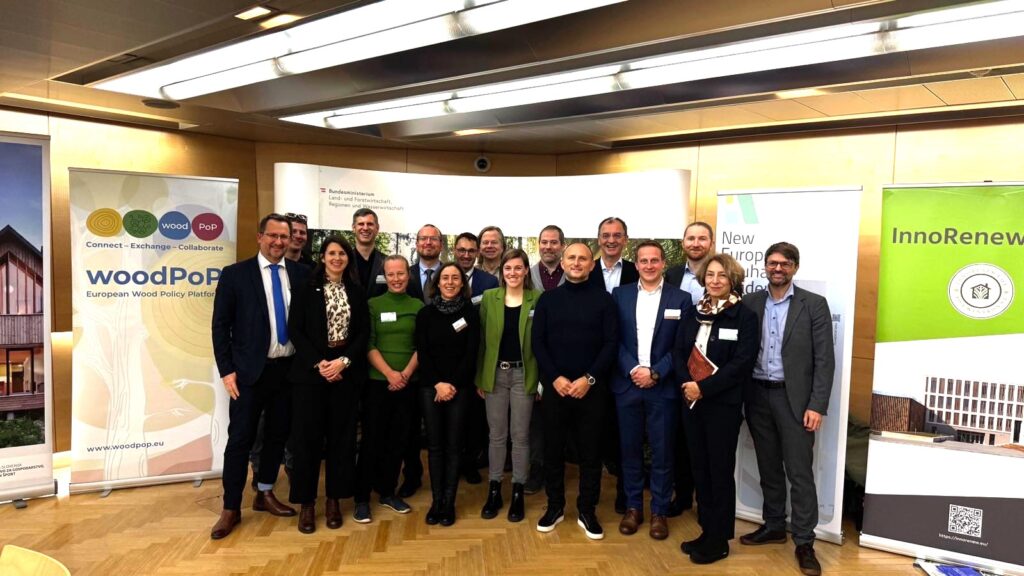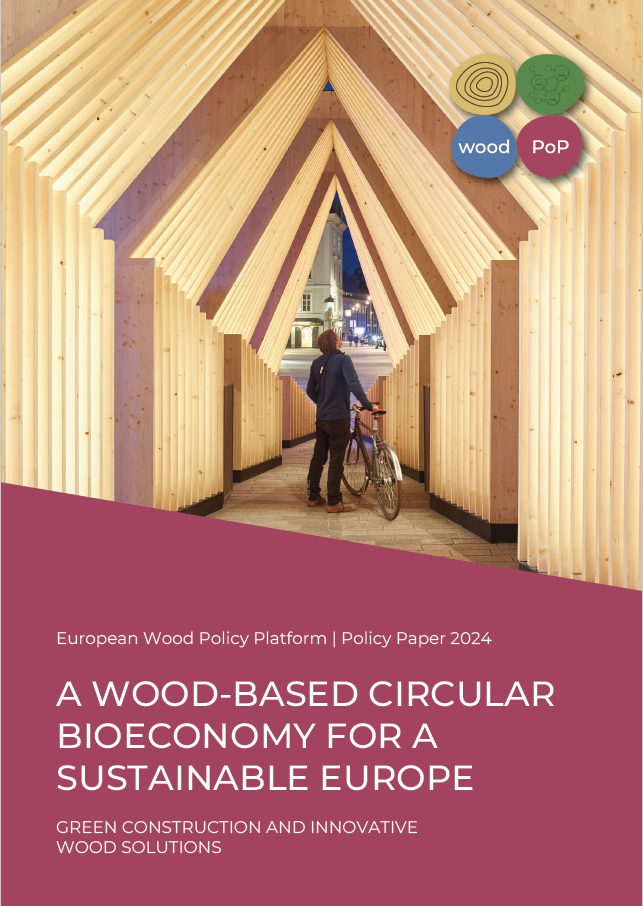Education and training are keys to successful timber construction and a sustainable transformation of the building industry!
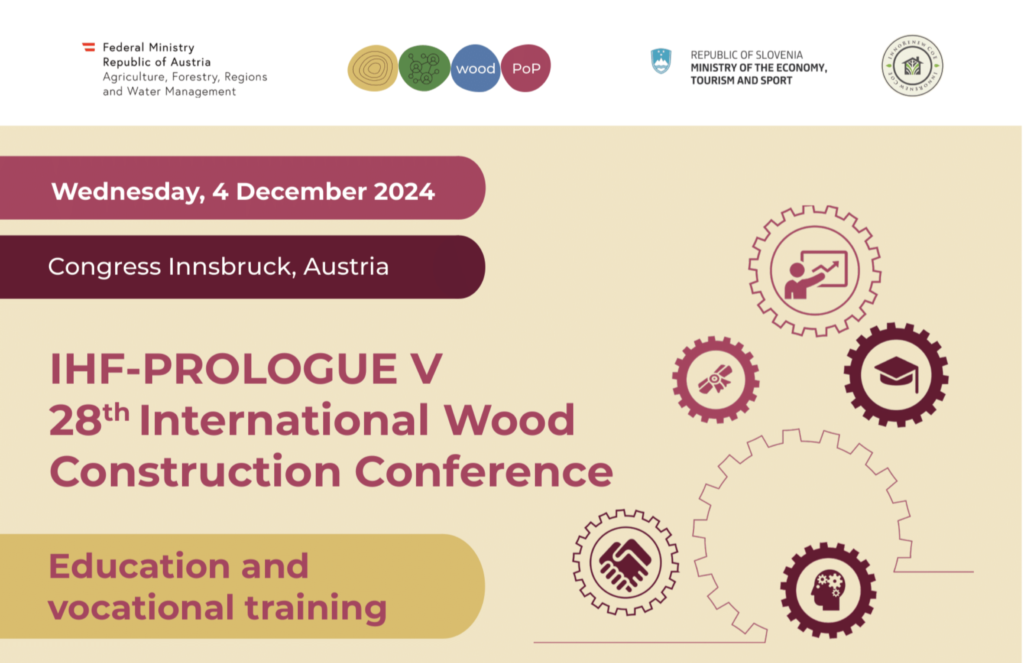
Innsbruck, Austria — The 28th International Timber Construction Forum (IHF) took place in Innsbruck from December 4 to 6, 2024. Under the motto “From practice – for practice”, experts from industry and trade, science, teaching, research, politics and administration will shed light on various timber construction topics.
Info: https://www.forumholzbau.com/IHF/
As part of the IHF, the “Education and Vocational Training” working group of the European Wood Policy Platform WoodPoP organised the “IHF Prologue 5” on the topic of “Perspectives of the New European Bauhaus Academy on education and training in the timber construction sector” on Wednesday, December 4.
Info: https://www.forumholzbau.com/IHF/Programm.php
Timber construction: the key factor in the decarbonization of the construction sector
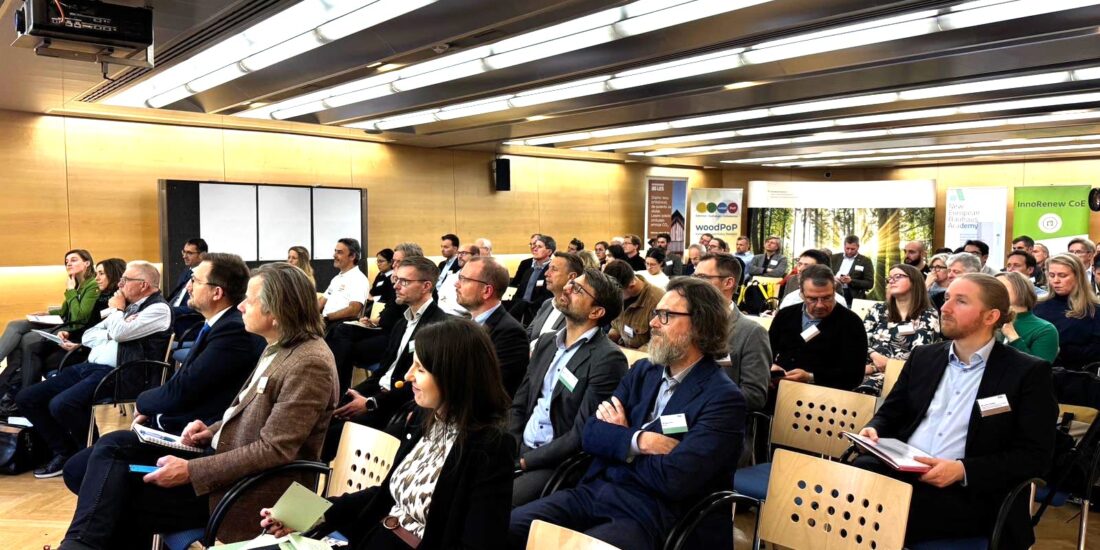
A drastic reduction in CO₂ emissions is needed to achieve the Paris climate targets. These are to be halved by 2030 compared to 2010 levels, and net emissions are to be zero by 2050. The construction and real estate sector is one of the strongest drivers of global warming. Around 40 percent of energy consumption and around 36 percent of CO₂ emissions in the European Union are currently attributable to buildings. Worldwide, 39 percent of annual greenhouse gas emissions can be attributed to real estate. Of this, 28% is attributable to operational carbon, which is released during building use, and 11% to embodied carbon. This includes emissions generated during the extraction of raw materials, the production of building materials and the construction and demolition of a property.
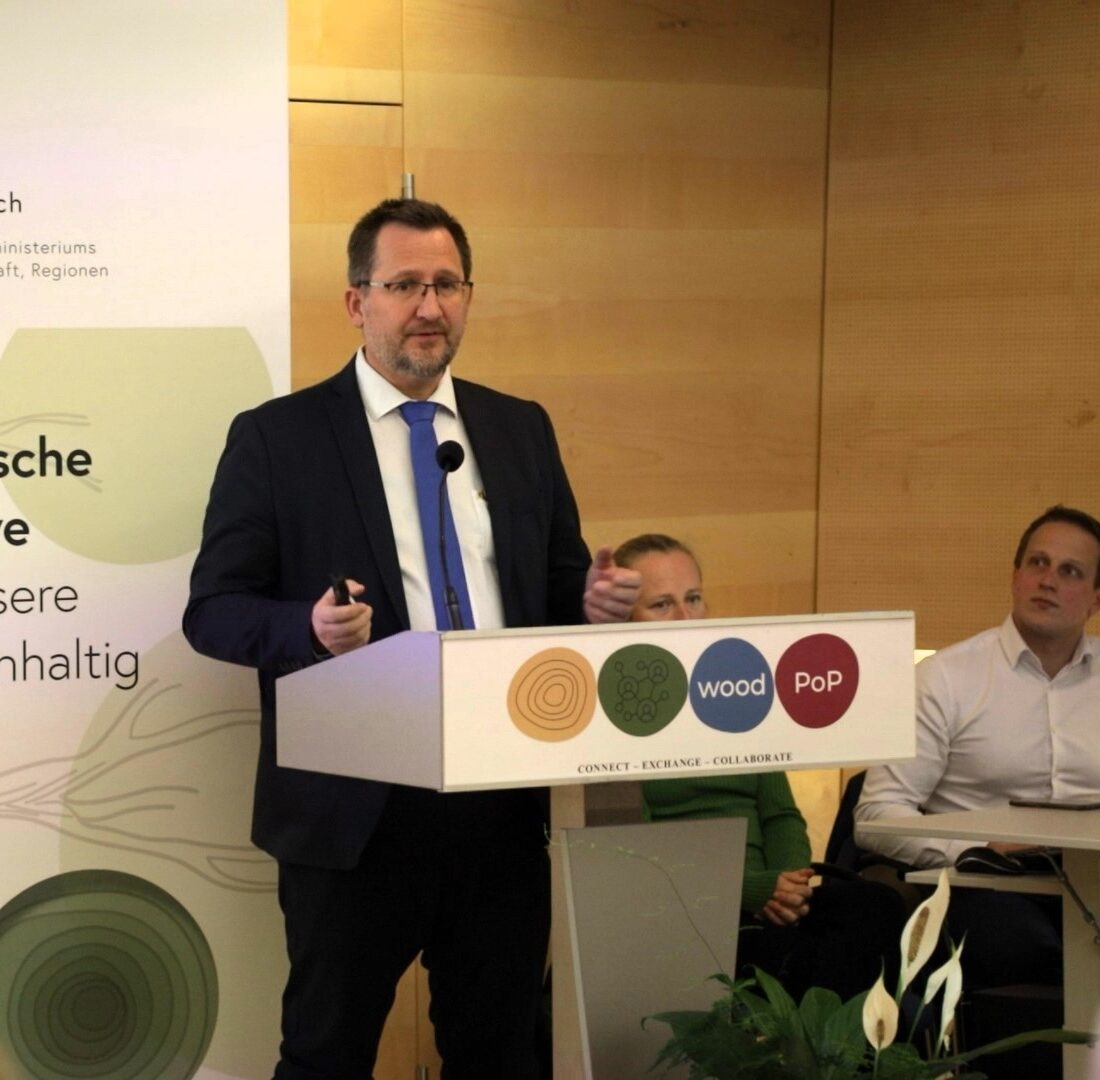
Decarbonizing the construction and real estate sector is therefore an urgently needed step towards curbing global warming and its consequences for life on our planet. Wood is a climate-friendly and – thanks to scientific and applied research – highly versatile alternative to other building materials, and is enjoying increasing demand.
However, combating the climate crisis urgently requires an acceleration in the transfer of knowledge and expertise. In particular, the cross-sectional subject of timber construction demands well-trained specialists interested in further training in planning, engineering and the trades involved, but also on the part of clients, politics and administration. The current shortage of well-educated workforce and specialised educational institutions is slowing down growth and innovation in the timber construction industry – and therefore the regenerative reorientation of the entire real estate sector.
Timber construction needs lifelong learners
The growing interest in timber construction, new technologies and possible applications for wood and types of wood pose new challenges for training and further education in the timber construction sector. Interdisciplinary training and further education programs and lifelong learning are becoming increasingly important. Platforms such as the New European Bauhaus Academy (NEBA) offer exciting starting points for new forms of knowledge transfer.
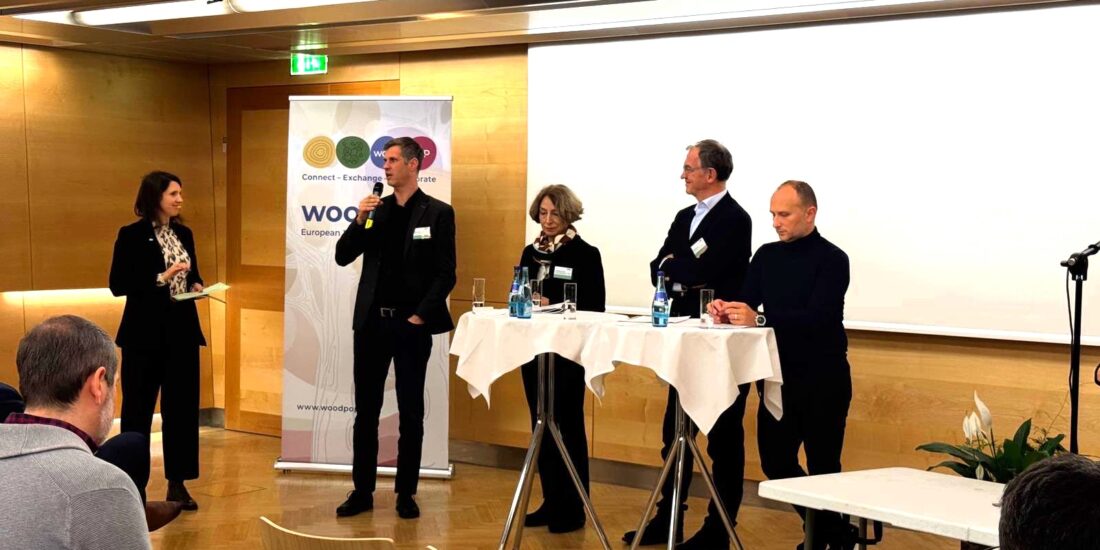
- How does the New Bauhaus Academy intend to advance its educational and transformational work?
- How are politics, administration and educational institutions involved in the NEBA at different levels?
- What strategies and measures are suitable for achieving the goals quickly? Which examples of good practice offer guidance?
- What key skills do timber construction companies in Europe need?
- What training and further education opportunities do architects, politicians and the general public need?
- How can lifelong learning be integrated into the day-to-day work of companies?
- How can timber construction engineers facilitate the planning work of architects and compensate for their specific training gaps?
- How can timber construction and “its” educational institutions make themselves even more attractive, especially to young people?
The “Education and Vocational Training” technical working group of the European Wood Policy Platform WoodPoP investigated these questions as part of the International Wood Construction Forum. The “IHF Prologue V” on the topic of “Perspectives of the New European Bauhaus Academy on education and training in the timber construction sector” brought together renowned speakers and discussants, including
Michael Burnard
Michael Burnard, who grew up in his parents' sawmill in Oregon (USA), is Deputy Director of InnoRenew CoE and Associate Professor at the University of Primorska. He came to Slovenia in 2013 and received his PhD from the University of Primorska. Research interests: human health in built environment and interdisciplinary work combining IT and data science.
Prof. Oya Atalay Franck
Oya Atalay Franck is an architect, architectural historian and educator. She was President of the EAAE/AEEA from 2017 to 2024 and is Professor of Architecture, Dean and Managing Director at the School of Architecture, Design and Civil Engineering at the ZHAW Zurich University of Applied Sciences in Winterthur (Switzerland).
Wolfgang Kern
Wolfgang Michael Kern, architect, teacher and head of the Department of Schools and Secondary Schools for Engineering, Arts and Crafts at the Federal Ministry of Education, Science and Research.
Uwe Kies
Uwe Kies is Secretary General of InnovaWood, the European network for wood science, research, innovation and education. He is also Chairman of the Wood4Bauhaus Alliance, a political platform to promote the use of wood in the construction sector. Uwe holds an MSc in Forest Information Technologies from HNEE and a PhD in Natural Sciences from WWU University Münster in Germany.
Matti Kuittinen
Matti Kuittinen is an architect and professor of sustainable building at the Faculty of Architecture at Aalto University (Finland). His research focuses on climate impacts and carbon flows in the built environment. While working at the Finnish Ministry of the Environment, Kuittinen developed the national life cycle carbon assessment methodology and initiated the Nordic Bauhaus program.
Andreja Kutnar
Andreja Kutnar is a professor of wood research at the University of Primorska in Koper, Slovenia, and head of the InnoRenew CoE research institute. Her areas of expertise include wood composites, thermohydromechanical treatment of wood and adhesive bonding. In 2022, she co-authored the Horizon Europe - New European Bauhaus Nexus Report. She is coordinator of the New European Bauhaus Academy Alliance. She is currently also a member of the Climate Council of the Republic of Slovenia and a member of the Commission for Sustainability in Sport at the Slovenian Olympic Committee.
Stefan Leitner
Stefan Leitner, Head of the Education Department at Holzbau Austria and until 2024 Chairman of the Technical Commission at Timber Construction Europe, the Berlin-based European umbrella organization of small and medium-sized timber construction companies.
Rok Prislan
Rok Prislan, acoustic designer and consultant, heads the research department for building acoustics at InnoRenew CoE. His main research topics are advanced measurement techniques for sound field characterization and geometric room acoustics modelling.
Georg Rappold
Georg Rappold heads the Wood Policy, Bioeconomy and Innovation Department at the Austrian Federal Ministry of Agriculture, Forestry, Regions and Water Management, and is also Chair of WoodPoP.
Darko Sakjo
Darko Sajko was Head of the Department for Development Incentives in the Wood Industry at the Ministry of Economy of the Republic of Slovenia and has been Director General of the Wood Industry Directorate since 2022.
Veronika Steinhofer-Juch
Veronika Steinhofer-Juch, has worked for the Austrian Ministry of Foreign Affairs and Ministry of Agriculture as well as for the FAO. The political scientist coordinates the secretariat of the European Wood Policy Platform WoodPoP and moderates the “IHF Prologue 5”.
Matej Vukmanič
Matej Vukmanič, expert with more than two decades of experience in the prefabricated house industry, specializing in timber construction and the sale of prefabricated timber houses. He is currently CCO at Lumar, the largest Slovenian manufacturer of prefabricated timber panels and solid timber constructions.
Erich Weisner
• Erich Wiesner, fifth-generation managing director and owner of the timber construction company WIEHAG in Altheim (Upper Austria), has left his mark on timber construction worldwide. With extraordinary projects such as the world's tallest timber-hybrid building in Milwaukee, the architectural masterpiece World of Volvo in Gothenburg and Asia's largest timber construction in Singapore, WIEHAG sets international standards in timber construction.
Guido Wimmers
Guido Wimmers, architect and civil engineer, Professor of Civil and Environmental Engineering at the University of Northern British Columbia (UNBC), Canada. Initiator of the Austria House for the 2010 Olympic Games, the first Canadian passive house and the first application of cross laminated timber and glulam in Canada. Co-founder of Passive House Canada. Co-developed North America's most stringent energy efficiency code for buildings, the BC Energy Step Code Since 2023, director of building-related educational programs at the British Columbia Institute for Technology (BCIT).
Vera Winthagen
Vera Winthagen, an industrial designer by training and a policy analyst, is the acting head of unit of the New European Bauhaus in the European Commission.
Presentations and Video Message from the IHF 2024 Prolog V: Education and Vocational Training
1. Welcome Slides
2. a. New European Bauhaus by Michael Burnard (University of Primorska/InnoRenew CoE (SLO)
2. b. Video Message by *tba*
3. New European Bauhaus Academy Alliance slides presented by:
NEB Hub by Andreja Kutnar, University of Primorska/InnoRenew CoE (SLO)
NEBA North Hub by Matti Kuittinen, Aalto University, Helskini (FIN)
NEBA Outreach Hub by Uwe Kies, InnovaWood, Brussels (BEL)
4. Innovative education, training and microcredentials presented by:
Stefan Leitner, Holzbau Austria,Vienna (AUT)
Wolfgang Kern, Federal Ministry of Education, Science and Research, Vienna (AUT)
Guido Wimmers, British Columbia Institute of Technology, Vancouver (CAN)
5. Live Experiment: Acoustics of Timber Buildings (slides) by Rok Prislan, University of Primorska/InnoRenew CoE
About WoodPoP

WoodPoP is an initiative supported by countries within and outside the EU, in which experts along the entire forest-wood-paper value chain sit down at the same table with politicians and administrators as well as with scientists and researchers. Its aim is to develop a common understanding of wood policy. In addition to Austria, representatives from the following countries are participating in WoodPoP: Finland, Sweden, Norway, Iceland, Ireland, the United Kingdom, Denmark, Estonia, Latvia, Lithuania, Poland, the Czech Republic, Slovakia, Hungary, Slovenia, Serbia, Bosnia-Herzegovina, Turkey, Italy, Spain, France, the Netherlands, Belgium, Germany, Switzerland – and with observer status Luxembourg and the Canadian province of British Columbia. Five technical working groups have started work: Governance, led by Austria; Building, led by Germany and Finland; Research and Innovation, led by Switzerland; Education and Vocational Training, led by Slovenia; and Communication and Information, led by the Czech Republic.
On November 6, 2024, the wood policy platform “WoodPoP”, which is supported by 25 European countries, adopted a policy paper. Entitled “A Wood-Based Circular Bioeconomy For A Sustainable Europe: Green Construction and Innovative Wood Solutions”, it provides a solid foundation for political decision-makers. It contains a joint commitment to an economically valuable, ecologically sensitive and socially responsible timber industry, which is a crucial piece in the mosaic for achieving climate targets. “WoodPoP” was launched in 2022 and initiated by Austria and Finland.
Access the Policy Paper Here: “A Wood-Based Circular Bioeconomy For A Sustainable Europe: Green Construction and Innovative Wood Solutions”
Access the form here to Associate with Policy Paper of the European Wood Policy Platform (WoodPoP).
